What Japan did in WWII - Thailand
One of my favorite bloggers posted another episode of "what Japan did in WWII" for Thailand version. This blogger came across a local TV program shedding light on the bright side of Japanese military while it's a taboo for most of the major TV channels in Japan.
The TV program aired only in Kyshu island goes with the outbreak of WWII near Thailand:
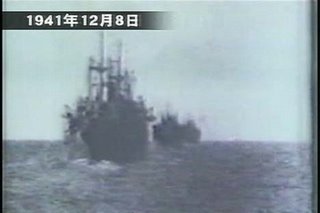
The onset of amphibious landing on Kota Bharu started December 8th, 1941, an hour earlier than Pearl Harbor. Japanese military advanced their troop to the south of Malay peninsula where it was governed by Britain. Japan occupied Singapore within 2 months.
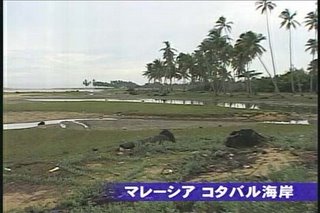
The main battlefield shifted to Burma (Myanmar), and allied Japan with the volunteer army formed by the local Burmese soldiers occupied Yangon, the capital in March, 1942. It is said that the citizens welcomed the triumph of allied force when marching into Yangon.

Wu Denyo joined the volunteer military, and was trained by Japanese troop for their independence.
Wu Denyo "I am grateful for the support of our independence from Japan even now."
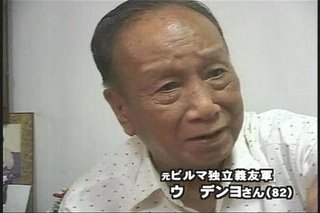
The TV coverage crew was headed to the next battlefield, Mandalay to chronologically trace the trail of Japanese troop. This city is the important hub to the eastern city of India, Imphal.
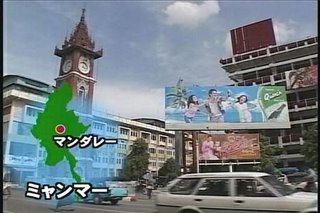
The war situation was suddenly deteriorated in 1943 after Burmese proclamation of their independence. They had few food supply for only three weeks, and they were forced to continue the battle. This operation ended up with a defeat, leaving hungry Japanese troops in retreat. Many Japanese soldiers crossed the border to Thailand to evade the pursuers.
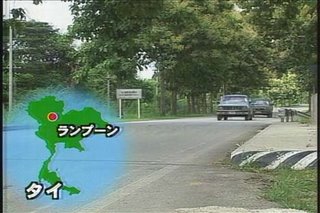
One of those members, Fujita, lives still now in a northern town of Thailand, Lampoon. His unit left him due to his leg wounded during Imphal operation.
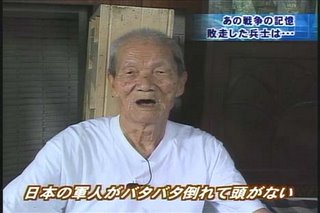
Fujita "When retreating from Burma, I saw a lot of dead Japanese bodies lying along the path. Many of those bodies didn't have their heads on it. You go fetch water to the valley and you find the heads in the basin. Predatory beasts take only those heads away and eat them. I often saw those horrible bodies on our way."
This trail was later referred to as "bones trail" after the Japanese defeat with 50,000 of war dead.
Fujita collected little fingers of dead bodies to ask somebody to send those fingers to Yasukuni Shrine for commemoration. But he lost the two cans of fingers from hundreds of bodies. After the war, he again visited the battlefield, and he buried the bones in his backyard.
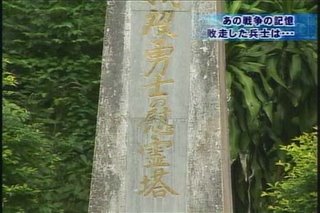 (This pic is the gravestone.)
(This pic is the gravestone.)There's a veteran who published a book of his experience in Burma and Thailand. The staff flew back to Japan to hear his talk.
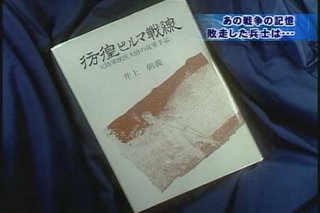
Inoue, the veteran carried a camera to South East Asia as taking photos was his hobby. He took more than 500 photos during the war. He turns back the miserable defeat.
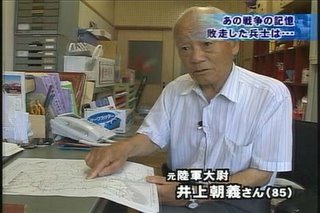
Inoue: "British military advanced 10 steps forward daytime and 3 steps backward night time. They are careful enough to deploy tanks and made them ready for opening fire after they retreat. Our infantry make a night attack, but as I said it was a trap. All of sudden they lightened the place to see us and make an assault on us with the tanks. "
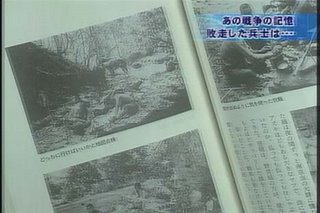
He couldn't stare at dead bodies of his friends. But he left in this book dozens of pictures with smilings of them. He also collected the photos of Burmese peoples' livelihood.
Inoue: "When entering Thai from Burma, villagers there were very kind to us. They even reduced their meal to share with us. I'd say they saved my life."
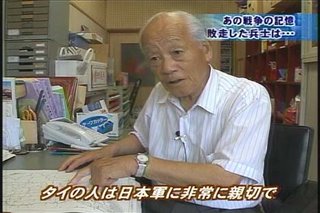
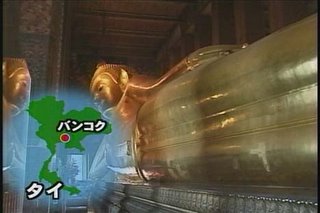
We found Thai army has an archive on Japanese military in Bangkok. Here's the Japan's government proclamation to its military for the treatment on Thai.
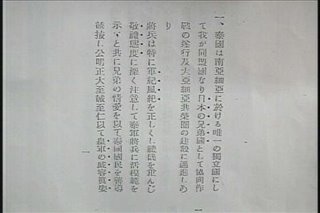
(Translation of the paragraph: Thailand is the only independent country and the ally of Japan. As the brother's country, proceed together toward the operation of the battles and the propagation of the great east asia co-prosperity sphere. Kenpei, the military police, therefore must be very aware of their moral and attitude to Thai military police to demonstrate a good example, etc. Other directions include how to deal with their religeon or traditions.)
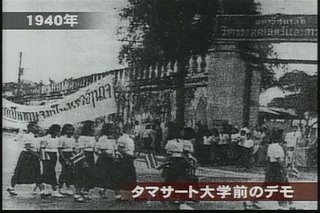
There was a demo in front of Thammasat University: Students are holding up a flag, "We don't want to be a slave of anyone." (yellowpeep: I don't quite know who they are claiming this to. Please give me a comment if you know the detail about this demo.)

Japan placed several logistic bases in Thailand. This poster above was what they saw in their bases, saying "Shaking hands with Japan will make Thai develop."
We found an old man, in Khun Yuam, Thai, who knows the village during WWII.

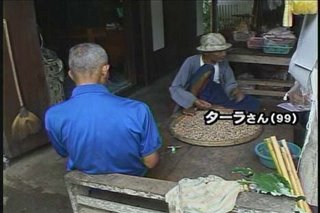
Thala (99): "Japanese military were friendly to us. Since we had 10 elephants at that time, we let them on the elephants to transport wounded soldiers to Chiang Mai for 500 baht. We brought rice and other food on our way."
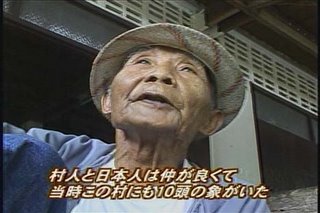
"There was not few who died on their way to the hospital in Chiang Mai," says Thala. Soldiers with rather healthy condition had to walk to the hospital beyond the border for 400km(~250 miles).
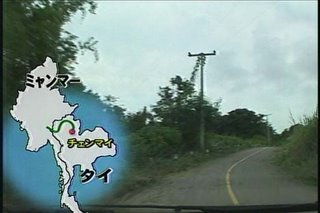
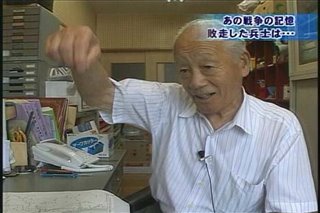
Inoue: Since we were running low on everything, we gave our belongings to the local people for food. It was like, "Tri, Tri? (how much?)" and if I need rice, I respond, "Ta. (rice)" They wanted my shirt, so it's a negotiation.
The next destination we set was Chiang Mai, the big city with the hospital and Japan's logistic base.
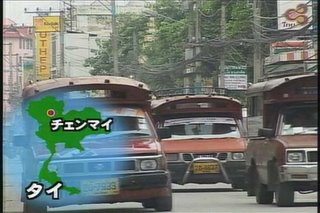
We heard an interesting story and artifacts from Chu Chai(65), a retired police chief in Chiang Mai. He has owned canteens and clothes of Japanese soldiers and gave us a talk:
Chu Chai(65): "I was working in Khun Yuamn, and heard an astonishing story from the people. They kept those canteens and clothes of Japanese soldiers. (And he showed them to us. Probably he got some of them as a gift from the village people when he was discharged there.) Not only them did they stored, but look at those military clothing, cooking pots, cloaks, and hats." (Remember that the village Khun Yuamn was the one where the village people gave soldiers rides on their elephants to the hospital.)
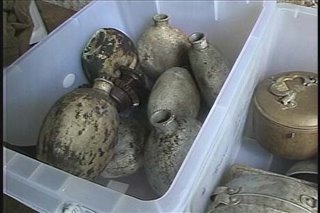
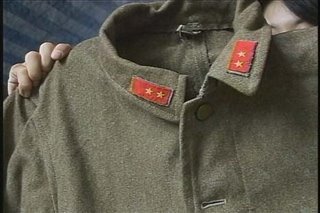
Chu Chai(65): "Plus, what surprised me a lot was that the people remember those days as a sweet memory. I think some of them may still own those artifacts. What if those belonged to your grand parents? You leave them alone?"
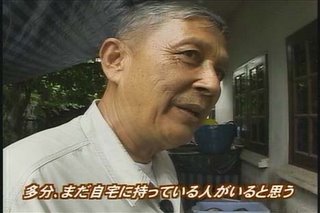
We came back to Khun Yuam where the people used elephants to transport wounded Japanese soulders. We found a small museum in the small village. That was founded after Chu Chai encouraged municipal government to preserve and memorialize the warm interactions.

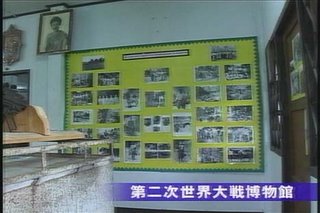
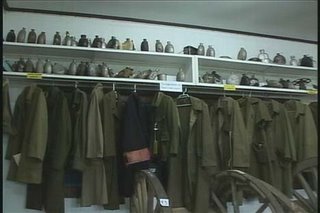
Chu Chai(65): As a kid, I knew the Japanese miliatary had been staitioed in places. But knowing better about it as a chief of the police, I became to think strongly to build something for peace.
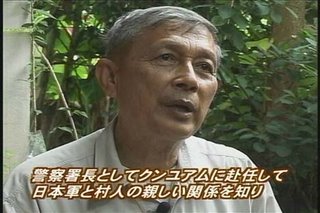
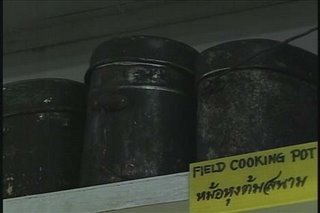
The artifacts desplayed in this museum have been increasing in number year by year.

It is said that the Japanese sodiers started working as farm helpers to manage to live. They healed themselves after defeat.


Kom soam (74) played with those Japanese stragglers in his youth.
Kom soam : We played a lot doing chasing each other in the river. They taught me how to dive.


Baan (80) used to be a hawker who sold sweets. She often went to a shrine where Japanese were staying to sell them. She sang a Japanese song taught by them.
おててつないで のみちをゆけば ♪ (you go up the trail holding hands)
みんなかわい ことりになって ♪ (Everyone be-comes a chirping bird)
うたをうたえば くつがなる ♪ (Clang clang you hear the steps when you sing)
はれたみそらに くつがなる ♪ (Clang clang you hear the steps seeing the sky)

There was a time when Baan's family let 5 Japanese stragglers stay. She barely speaks Japanese even now.

We drove up north to Faan county taking 3 hours from Chiang Mai. There we found a Japanese, Inami, who didn't realize his homecoming back to Japan. Inami (86) was born in Okinawa and came to this land. Unfortunately, his main unit left him with no money. He had to survive without any aid.

Inami: I started a business, with a Chinese entrepreneur, of dealing pump machine to pump up water from underground to feed water to farms. At that time, the nearby farmers had never seen those pumps. Our business was successful and contributed to steady crops in this area.

He says he never regrets not going back to Japan now that he has a wonderful wife and many children here.

One of his daughter went to Japan for study, and she is still living in Japan.
Inami: The war was just unnecessary and troublesome. I hope such a war never happens again whether we win or not. I don't recollect those days. If anything, I may try not to remember.

narator: We never thought that we had a history with Thailand although both countries never fought.

The other seires of "What Japan did in WWII":
What Japan did in WWII - Malaysia (prologue)
What Japan did in WWII - UK
What Japan did in WWII - Myanmar
What Japan did in WWII - Indonesia
What Japan did in WWII - Taiwan
What Japan did in WWII - Palau
What Japan did in WWII - Korea
What Japan did in WWII - Thailand
What Japan did in WWII - (epilogue)
Or go to main page?
http://yellowpeep.blogspot.com/2005/08/whole-contents.html
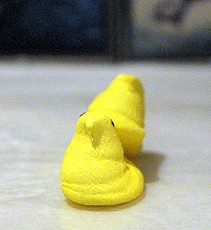

15 Comments:
Hey, you're back!
It's natural to pay a respect to those who had to fight to protect their family, land, or country. America fought Japan for their defense, IMHO. I'd be happy if you know that this series is not for letting down Western countries.
In Japan, on the contrary, it's not surprising to air programs letting down war deads. Especially, NHK, TBS and NTV.
mr.ballistic,
There's no war criminal in Japan although it is effective only in this country. Their honor has been recovered several decades ago. One of them got pardoned and became Prime Minister.
I'm not sure what Koreans are trying to do. But it is true that many Koreans became colonels or commanders and lead Japanese or Korean soldiers during WWII. I guess Japan deliberately promoted Koreans for the sake of maintaining their pride. Anyway, how they treat those war criminals in Korea totally depends on Korean. This article is about Thailand, so may be we can discuss Koreans in WWII some other time.
mr. ballistic,
I forgot to read the comment you posted a bit ago.
Some of Japanese survivors from WWII may have written their stories in Thailand, but I don't think there's famous films. Academia may have some, though.
As a twisted characteristic of Japanese, they don't care about Thailand because there's almost no protest against Japan about the deed in WWII. Japan is a country who gives sweets to fussy children like Korea or China.
Of course the TV program I summarized cannot be neutral. In order to correctly understand South East Asia such as Thailand, we need to remember that there are Chinese residents controlling its economy since long time ago.
Japan suppressed Chinese residents at that time, but which might be a good thing to natives. That also may be a plot to swoop in and make room for Japanese there. I don't know. So two ways of interpretation are possible. It is necessary to note which side wrote the history of Thailand, natives or Chinese residents.
Japanese Prime Minister, Abe, is trying to destroy Marxist teacher organization right now by rewriting laws. Those who are accusing of the Emperor mostly belong to the organization for school teachers, and brainwash kids since they choose history textbooks. Settlement comes only after power struggle, not after peaceful discussion.
FYI. Background info on the museum. See:
http://www.chiangmai-chiangrai.com/japanese_war_museum.html
Japanese War Museum
http://www.chiangmai-mail.com/174/news.shtml
Chiang Mai Mail 18-24 Feb 2006
"Cabinet spending 20 mio baht to restore the World War II Japanese Museum"
http://www.irrawaddy.org/aviewer.asp?a=4909&z=102
The Irrawaddy --- covering Burma and Southeast Asia
“Skeleton Road”
By Jim Andrews/Mae Hong Son
August 2005
http://www.chiangmainews.com/indepth/details.php?id=527
Citylife Chiang Mai magazine
"Remembering the War"
This is one of my favorite blog site. Every time I got some thing new and interesting information here. I must appreciate your blog site. Good job! Keep posting.
Wow! It's awesome blog post here.... really very interesting for reading..... I enjoyed it. Thanks for the share....
kamagra online.
Thanks a lot for this nice informative post I like it so much keep posting and updating the blog.
Smith Alan
Thanks for sharing these information about World War 2! There are so many unpublished information out there. Some of them won't even be revealed ever.
thanks for the information.. with your information..i could get ahead with my project.. thank for your information.. once again..
Really you have done great job,There are may person searching about that now they will find enough resources by your post.I like this blog.
Wow! It's awesome blog post here. really very interesting for reading.Like those pictures.. I enjoyed it.
It cannot have effect in reality, that is what I think.
Mesmerized article written on this blog with other relevant information. It is straight to the point that how we can improve our skills as well as how we can be represented to a new stream of professionalism.เทคนิค forex
I need to to thank you for this very good read!! I certainly enjoyed every bit of it. I've got you bookmarked to look at new stuff you post?
ghế gỗ
Your style is very unique compared to other people I've read stuff from. Thanks for posting when you've got the opportunity, Guess I'll just book mark this page.
Click here
Post a Comment
Subscribe to Post Comments [Atom]
<< Home